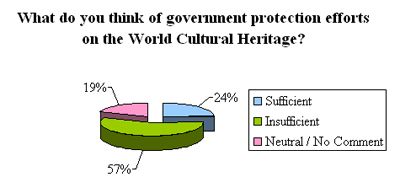"I'm glad to see that Macau citizens can negotiate and strive for what they want with the government," says by António Ng Kuok Cheong, member of the Legislative Assembly of the Macau Special Administrative Region.
After the incident of protecting the Guia Lighthouse three months ago, and the suspension of the plan to pull down the Social Welfare Bureau building in June 2006, it has brought to the attention of Macau citizens the protection of the World Cultural Heritages in Macau. Does the government provide adequate protection for the Cultural Heritage sites? Will further development efforts affect and threat the World Heritage sites in Macau?
In order to investigate citizens' opinions, we distributed 100 questionnaires and received 90 of them on April 2, 2007. In our survey, 57% of the interviewees think that the government is not providing adequate protection for Cultural Heritage. They comment that in order to avoid Macau's World Heritage being classified into the "World Heritage in Danger List", it is vital for the government to invest more capital to guarantee adequate maintenance and labor force for the sites and monuments, and to set up rules and regulations for their protection and conservation.

Even though Ng is in a neutral position on the issue of protecting the World Cultural Heritage, he is happy to note the courage and determination of Macau citizens on protect the World Cultural Heritage. However, there are some historical locations that cannot be kept, for instance the Red Forest. Ng observes that there are indeed not many successful cases of heritage building protection, and a large proportion of cases are failures. Thus, he asserts, "Economic development is the premiere concern of the government."
Ng comments that the government may protect the World Cultural Heritage that may bring economic benefits. "The protections are still insufficient and limited. Meanwhile the government in fact does not seem to have the intention to safeguard other heritage properties, but will do so only if they may bring profits. The relationship between the government and the properties is like a cycle. If the properties can attract tourists and stimulate development, the government will then take more care of them." He continues, "If the properties are unable to bring in earnings and fail to attract tourists, they are deemed useless no matter how well the properties are kept. It is certain that the government will pay less attention to such structures. The protection value of each property is calculated and thus varies based on economic terms."
Regarding the possibility that the United Nations Educational, Scientific and Cultural Organization (UNESCO) may consider the World Cultural Heritage in Macau as the "World Heritage in Danger List" in the future, Ng says that this scenario is unlikely to happen. "The government acknowledges the importance of this issue too. Because of these heritage sites, Macau now has an advanced status both politically and economically. If we find any incident in which the World Heritage properties may deteriorate or be affected, we will definitely bring it up in meetings, and remind our government of the World Heritage in Danger List. In order to retain the fame and reputation of Macau, the government must take further consideration before making final decisions." Ng emphasizes.
Nevertheless, 82% of interviewees in our survey believe that the possibility may exist if the government still does not plan for further protection. The major problems suggested through the questionnaires include the messy building construction of the city, air pollution, and little improvements in the city's environment, etc.
In September 2006, a long-standing restriction was lifted by the government on the maximum height of buildings near Guia Hill. Over 80% of the interviewees strongly oppose this issue. The reason for their opposition is that this would ruin the sightseeing value of the Guia Lighthouse. One interviewee suggests that there should not be more buildings that exceed the old height restriction, and some of the current constructions are already too high. About 5% of the interviewees comment that there are too many casinos and other constructions in Macau, and these will seriously affect the general construction of Macau, as well as the city's transportation. Besides, the planning of the city is not consistent and it is in a mess. "It is necessary to set up regulations for the planning of the city, and these should not be altered any way once they are approved," Ng continues. "I have proposed a lawful planning of the city for a year; however, there has been neither feedback nor comments provided to me up to now." He points out that the reclamation projects have greatly affected the planning of Macau.
|